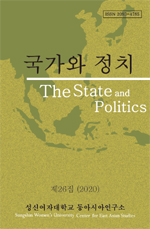한국과 인도네시아의 민주주의의 경쟁성 확보를 위한 법제도 비교연구
A Comparative Study on Legal System for Competitiveness of Democracy in South Korea and Indonesia
- 성신여자대학교 동아시아연구소
- 국가와 정치
- 제26집
-
2020.021 - 41 (41 pages)
- 81

본 연구의 목적은 한국과 인도네시아의 민주주의를 ‘경쟁성’ 측면에서 설명하고, 경쟁성을 확보하기 위해서는 어떠한 법제도가 필요한지에 대해 분석하는 것이다. 경쟁성은 시민사회의 대표성을 측정하기 위한 원리로, 민주주의에서 매우 중요한 개념이다. 경쟁성의 측면에서 한국과 인도네시아는 참여의 규칙을 제도적으로 보장하고 있다. 하지만 한국은 선거관리위원회의 독립성에서는 좋은 평가를 받았지만 하향식 공천방식에서 경쟁성이 제한되어 있었다. 인도네시아는 공천구조의 폐쇄성과 선거관리위원회의 독립성 결여로 경쟁성이 제대로 보장되지 못하였다. 경쟁의 규칙이 제도적으로 보장되는 상황에서 정당의 공천경쟁성이 민주적이고, 독립적으로 선거관리가 이루어진다면, 이것은 투명한 경쟁성으로 평가된다. 한국은 독립적인 선거관리위원회의 활동에 대해서는 긍정적으로 평가되지만 공천과정의 폐쇄성으로 공천경쟁성이 민주적으로 평가되지 않았다. 이러한 측면에서 한국의 경쟁성은 제한적으로 투명하다는 의미에서 반투명한 경쟁성의 양상으로 평가되었다. 반면에 인도네시아는 경쟁성을 평가하는 공천경쟁성과 선거관리에서 모두 부정적인 평가를 받았다. 이러한 측면에서 인도네시아의 경쟁성은 불투명한 경쟁성으로 평가되었다. 한국과 인도네시아는 모두 경쟁성 측면에서 부분적으로 제한받고 있다. 특히 인도네시아는 한국보다 제도적 측면에서 경쟁성이 보장받지 못하고 있다. 따라서 ‘경쟁성’ 측면에서 법제도의 구축을 통해 민주주의를 보다 발전시켜야 한다. 또한 제도가 실행되는 과정에서 나타나는 비민주적 상황들은 제도적 보완을 통해 개선되어져야 할 것이다.
The purpose of this study is to compare democracies of South Korea and Indonesia with the special emphasis of competitiveness, it is to analyze what legal system is needed to have competitiveness. Competitiveness indicates the political relations of the state and the society. In terms of competitiveness, South Korea and Indonesia promise political participation of the society. South Korea has the National Election Commission which monitors the election process and make sure elections to be fair. In this respect, South Korea could be evaluated as having an equal opportunity for political participation. However, the National Assembly candidates are chosen through a top-down selection process, which eventually limits participation from the society. By the way, the National Election Commission of Indonesia cannot guarantee its autonomy. The process of selecting candidates of the Indonesian National Assembly is much more ambiguous. If the rules of the competitiveness are institutionally guaranteed and the process of selecting a candidate is open, the level of competitiveness is evaluated as high. South Korea can be evaluated as highly developed with regard to the independence of its election commission. But the candidate selection process is not democratic by virtue of a closed nomination process, which is a down side of the system. Indonesia can be evaluated poorly in the level of competitiveness because the independence of the National Election Commission is not guaranteed and its candidate selection process is not open. Both South Korea and Indonesia are partially limited in terms of competition. In particular, Indonesia is not as competitive in institutional terms as South Korea. Therefore, democracy should be further developed through the establishment of legal system in terms of ‘competitiveness’. In addition, non-democratic situations in the implementation of the system should be improved through institutional supplementation.
Ⅰ. 서론
Ⅱ. 경쟁성의 측정
Ⅲ. 한국의 경쟁성 측면의 법제도
Ⅳ. 인도네시아의 경쟁성 측면의 법제도
Ⅴ. 한국과 인도네시아의 경쟁성 확보를 위한 법제도 비교
Ⅵ. 결론
(0)
(0)